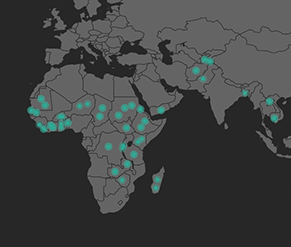Globally, there are 50-75 million ‘marginalized’ children who are not enrolled in school. Children whose primary language is not the language of instruction in school are more likely to drop out of school or fail in early grades. Research has shown that children’s first language is the optimal language for literacy and learning throughout primary school (UNESCO, 2008a). In spite of growing evidence and parent demand, many educational systems around the world insist on exclusive use of one or sometimes several privileged languages. This means excluding other languages and with them the children who speak them (Arnold, Bartlett, Gowani, & Merali, 2006).
The risks of a foreign language of instruction
It is not hard to grasp all that is at stake: parents not enrolling their children in school at all, children not able to engage successfully in learning tasks, teachers feeling overwhelmed by children’s inability to participate, early experiences of school failure, and so on. Some children do succeed, perhaps through a language transition program that helps them to acquire the language of instruction. But there is the risk of negative effects whereby children fail to become linguistically competent members of their families and communities and lose the ability to connect with their cultural heritage.
While some children continue to develop proficiency in their first language while succeeding in school in a second language, this does not happen automatically.
Increasingly, it leads to an inability to communicate about more than mundane matters with parents and grandparents, and a rapid depletion of the world’s repository of languages and dialects and the cultural knowledges that are carried through them.
Preserving mother tongues
Many linguistic groups are becoming vocal about the need to ensure that the youngest members of their communities keep their linguistic heritage. Some governments, such as in the Philippines, have recently established language-in-education policies that embrace children’s first languages. A compendium of examples produced by UNESCO (2008b) attests to growing interest in promoting mother tongue-based education, and to the wide variety of models, tools, and resources now being developed and piloted to promote learning programs in the mother tongue.
Children learn better in their mother tongue
UNESCO has encouraged mother tongue instruction in primary education since 1953 (UNESCO, 1953) and UNESCO highlights the advantages of mother tongue education right from the start: children are more likely to enroll and succeed in school (Kosonen, 2005); parents are more likely to communicate with teachers and participate in their children’s learning (Benson, 2002); girls and rural children with less exposure to a dominant language stay in school longer and repeat grades less often (Hovens, 2002; UNESCO Bangkok, 2005); and children in multilingual education tend to develop better thinking skills compared to their monolingual peers (e.g., Bialystok, 2001; Cummins, 2000; King & Mackey, 2007).
Some educators argue that only those countries where the student’s first language is the language of instruction are likely to achieve the goals of Education for All. Research also suggests that engaging marginalized children in school through mother-tongue based, multilingual education (MTB-MLE) is a successful model (Benson & Kosonen, 2013; Yiakoumetti, 2012). We are beginning to get answers to some key questions: Under what circumstances and with what resources can education in the mother-tongue combined with multilingual education be an effective approach whereby children become proficient in their home language while laying the foundation for learning in additional languages? What are the costs and benefits of alternative approaches directed at the individual, family, community, school, region, and nation? What are meaningful yet efficient ways to measure costs and benefits? What are the implications of MTB-MLE for recruiting, educating, and mentoring teachers and teacher assistants and for creating and evaluating curricula in diverse language classrooms? What are the contributions of family and community in formal and non-formal MTB-MLE, and how can these be measured?
More research needed
Investment in a coordinated program of research could advance knowledge about these kinds of questions in order to inform national language in education policies, teacher training, and local approaches.
More research is needed on steps that can be taken in the early years and during the transition to school to prepare children for the mix of language(s) that will be used in primary school.
Questions need to be explored about what are the most important outcomes and how best to measure them in various teaching and learning contexts. How should assessment of pedagogical effectiveness take into account the different pace of children’s growing competence in core skills including reading, writing, numeracy and problem solving when they learn through multiple languages?
There is also a gap in research on effective approaches for successful transitions of mother-tongue educated children to secondary school in a dominant language.
Family members play an important role as children’s ‘first teachers’ and research should explore the roles of informal and non-formal education and family interaction in promoting literacy, numeracy, and higher order cognitive skills using the mother tongue.
We need to involve community members with diverse language skills in formal school and train teachers with varying language capacities and levels of education to be effective in MTB-MLE classrooms. As knowledge develops, we must get better at communicating research findings so that practitioners, policy makers and donors are informed and motivated by evidence about how the potential of MTB-MLE can be harnessed to achieve Education for All.

